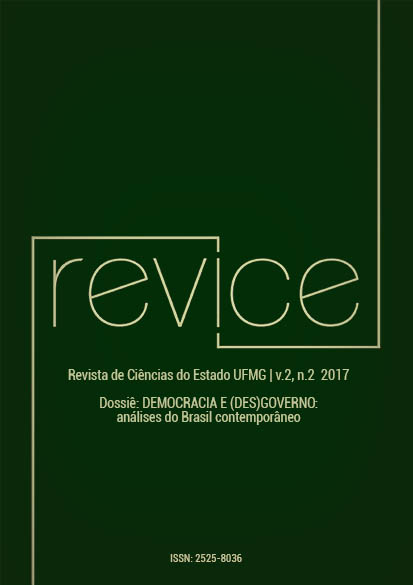O desfecho de Caleb Williams
a influência da narrativa sobre a política de William Godwin
DOI:
https://doi.org/10.35699/2525-8036.2017.5057Palavras-chave:
Willian Godwin, Caleb Williams, NarrativaResumo
William Godwin escreveu o romance gótico Things as They Are; or, the Adventures of Caleb Williams (“As Coisas como Elas São; ou, as Aventuras de Caleb Williams”, em tradução livre) em 1794 para disseminar suas ideias filosóficas e políticas. Inicio o artigo revisando a literatura para demonstrar como sua teoria influenciou tanto sua decisão de escrever ficções quanto o tipo de ficção que ele escreveu, mostrando como o autor usou e inovou convenções do gênero gótico para transmitir suas ideias para um público mais amplo. Então comparo duas perspectivas divergentes na literatura quanto à maneira como suas narrativas influenciaram suas ideias políticas e filosóficas, em particular a partir de comentários acerca do significado e do impacto de mudanças de última hora ao desfecho de Caleb Williams. Argumento que essa relação ambígua entre narrativa e política na obra de Godwin é relevante para reflexões políticas contemporâneas sobre a relação entre representação e ação política, ou como narrativas sobre a condição humana e realidades políticas podem afetas as ideias, atitudes e relações sociais de seus narradores.
Downloads
Referências
BODE, C. “Godwin’s Caleb Williams and the Fiction of ‘Things as They Are’”. In: AHRENDS, G., DILLER H., EULE, D. B. (Editores). English Romantic Prose: Papers delivered at the Bochum Symposium September 30 to October 1, 1988, p. 95-115, 1990.
BUTLER, M. “Godwin, Burke and Caleb Williams”. Essays in criticism, n. 3, p. 237-257, 1982.
CLEMIT, P. The Godwinian Novel: The Rational Fictions of Godwin, Brockden Brown, Mary Shelley. Oxford: Oxford University Press, 1993.
CLEMIT, P. “Introduction”. Caleb Williams, Oxford: Oxford University Press, pp vii-xxvii, 2009.
COHN, J. Anarchism and the Crisis of Representation: Hermeneutics, Aesthetics, Politics. Sellinsgrove: Susquehanna University Press, 2006.
COHN, J. “What is Postanarchism “Post”?”. Postmodern culture, vol. 13, n. 1, setembro 2002. Disponível em: <http://pmc.iath.virginia.edu/issue.902/13.1cohn.html>. Acesso em: 24 agosto 2017.
CORRÊA, F. Problemáticas teóricas e históricas dos estudos de referência do anarquismo. BIB, N. 76, p. 95-129, julho 2015.
COSTA, C. T. O que é anarquismo. São Paulo: Brasiliense, 2004.
CUDENEC, P. “Deconstructing our resistance?”. Paul Cudenec, 2015. Disponível em: 344<https://network23.org/paulcudenec/2015/12/26/deconstructing-our-resistance/>. Acesso em: 18 outubro 2016.
FERREIRA NETO, O. M. “As coisas como elas são”: moralidade politica e social em William Godwin (1790-1800). Dissertação de mestrado, Universidade Estadual de Campinas, 2012. Disponível em: <http://repositorio.unicamp.br/jspui/handle/REPOSIP/281849>. Acesso em: 24 agosto 2017.
GODWIN, W. Caleb Williams. Oxford: Oxford University Press, 2009.
GRAEBER, D. Fragments of an Anarchist Anthropology. Chicago: Prickly Paradigm Press, 2004.
GRAEBER, D. Lost People. Bloomington: Indiana University Press, 2007.
HANSSON, J. The genre of radical thought and the practices of equality: the trajectories of William Godwin and John Thelwall in the mid-1790s. History of European Ideas, p. 1-16, maio 2017.
LEE, B. Conflict between Ideas, and Forgiveness in William Godwin’s Caleb Williams. The Journal of Modern British & American Language & Literature, Vol. 34, N. 2, p. 1-19, maio 2016.
LEUWEEN, E. J. Anarchic alchemists: dissident androgyny in Anglo-American gothic fiction from Godwin to Melville. Dissertação de mestrado, Leiden University, 2006. Disponível em: <https://openaccess.leidenuniv.nl/handle/1887/4552>. Acesso em: 24 agosto 2017.
MOHAMMAD, S. M. S. The Psychological Effect of Political and Social Injustice on theIndividual in William Godwin’s Caleb Williams. English Language and Literature Studies, Vol. 7, N. 3, p. 48-52, agosto 2017.
PHILP, M. Godwin’s Political Justice. Ithaca, NY: Cornell University Press, 1986.
SÁ, D. S. Gótico tropical: o sublime e o demoníaco em O guarani. Salvador: EDUFBA, 2010.
SÁ, D. S. “The Monk: Um Schauerroman Inglês”. Itinerários, n. 37, p. 155-171, 2013. Disponível em: <http://seer.fclar.unesp.br/itinerarios/article/view/6899/4962>. Acesso em: 14 novembro 2016.
SCHWALM, H. William Godwin, Caleb Williams (1794). In: HAEKEL, R. (Ed.). Handbook of British Romanticism. Handbooks of English and American Studies, Volume 6. Berlin: Walter de Gruyter GmbH & Co KG, 2017.
WEIR, D. Anarchy and Culture. Amherst: University of Massachussets Press, 1997.
WOODCOCK, G. Os Grandes Escritos Anarquistas. São Paulo: L&PM, 1981.
YOUNG, I. M. Inclusion and Democracy. Oxford: Oxford University Press, 2002.
Downloads
Publicado
Edição
Seção
Licença
Copyright (c) 2017 Peterson Roberto da Silva

Este trabalho está licenciado sob uma licença Creative Commons Attribution-NonCommercial-ShareAlike 4.0 International License.
1. Os conteúdos dos trabalhos são de exclusiva responsabilidade de seu autor.
2. É permitida a reprodução total ou parcial dos trabalhos publicados na Revista, desde que citada a fonte.
3. Ao submeterem seus trabalhos à Revista os autores certificam que os mesmos são de autoria própria e inéditos (não publicados em qualquer meio digital ou impresso).
4. Os direitos autorais dos artigos publicados na Revista são do autor, com direitos de primeira publicação reservados para este periódico.
5. Para fins de divulgação, a Revista poderá replicar os trabalhos publicados nesta revista em outros meios de comunicação como, por exemplo, redes sociais (Facebook, Academia.Edu, etc).
6. A Revista é de acesso público, portanto, os autores que submetem trabalhos concordam que os mesmos são de uso gratuito.
7. Constatando qualquer ilegalidade, fraude, ou outra atitude que coloque em dúvida a lisura da publicação, em especial a prática de plágio, o trabalho estará automaticamente rejeitado.
8. Caso o trabalho já tenha sido publicado, será imediatamente retirado da base da revista, sendo proibida sua posterior citação vinculada a ela e, no número seguinte em que ocorreu a publicação, será comunicado o cancelamento da referida publicação. Em caso de deflagração do procedimento para a retratação do trabalho, os autores serão previamente informados, sendo-lhe garantido o direito à ampla defesa.
9. Os dados pessoais fornecidos pelos autores serão utilizados exclusivamente para os serviços prestados por essa publicação, não sendo disponibilizados para outras finalidades ou a terceiros.



